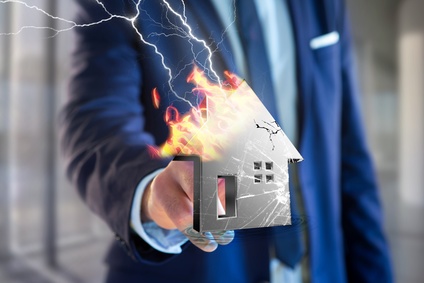E-bike and E-Scooter Warning for Landlords
Published on April 30, 2024 by Sarah Mac

London Fire Brigade has warned that e-bikes and e-scooters are now the fastest growing fire risk in London, having recorded 149 e-bike fires in 2023 and three deaths.
Many tenants in privately rented homes own e-bikes and e-scooters, and will be charging them in the property. The problem is that they are powered by lithium ion batteries, which in certain circumstances are prone to exploding.
E-bikes and e-scooters and their lithium ion batteries and chargers purchased from reputable companies and maintained properly are generally safe.
However, when cheap, unregulated batteries or chargers are used, or when the batteries are not properly cared for and used when damaged, they can become prone to overheating and catching light.
When they do catch light, it’s not a ‘normal’ fire. A phenomenon called ‘thermal runaway’ can occur. This is an uncontrollable, self-heating state where chemical reactions are accelerated and temperatures keep rising. The
The London Fire Brigade’s Deputy Commissioner explains, “Fires involving lithium batteries can be ferocious, producing jets of flame, and can be extremely challenging to put out. This type of fire also produces a highly flammable, explosive and toxic vapour cloud which should never be inhaled.”
The advice given in the event of this type of fire is not to try to put it out, but instead get out of the building immediately and call the fire brigade.
In what circumstances to e-vehicle batteries cause fires?
Devices catch light when they are being charged usually because they lack the right charger. Conversion kits also pose a risk, as they are unregulated.
During the first six months of 2023, out of 73 e-bike fires in London, over two thirds involved battery failure. At least 40% involved a converted e-bike. And more than 40% were believed to be charging at the time they caught light.
It appears that e-vehicle fires tend to happen most when:
- Unregulated replacement batteries have been purchased which lack essential safety features
- The batteries have been damaged – for example, if they have been dropped or punctured
- An incorrect charger is used for the particular battery
- Batteries have been subject to extreme temperatures – the majority have a safe operating temperature of between -20°C to 60°C
- Batteries are overcharged – for example they are plugged in for extended periods
How to protect your rental property against the dangers of charging e-bikes and e-scooters?
Lithium ion battery fuelled fires have the potential to completely destroy a property. Landlords should therefore take steps to make sure their tenants are aware of the dangers, and add a clause to the tenancy agreement requiring tenants to request permission to keep them.
It is also advisable to ask tenants to sign a set of safety rules, agreeing to:
- Only use manufacturer-approved batteries and chargers that meet UK safety standards
- Only use the charger that is the correct one for the battery
- Always follow manufacturer’s instructions, especially with regard to maximum charge levels
- Never to charge batteries when they are asleep or away from the property
- To always unplug the battery once it’s finished charging
- To disconnect batteries when not in use
- Never to use damaged batteries
- Never to tamper with or modify batteries
- To check batteries for damage before charging, looking for cracks, leaks or dents
- To ensure batteries are kept clean, as dirt and dust can cause them to overheat
- Never to block emergency escape routes with their e-bike or e-scooter
Tenants can also be referred to the e-bike and e-scooter advice provided by the London Fire Brigade. They should also be reminded of the importance of taking out their own contents insurance, making sure the policy covers incidents arising from e-bikes and e-scooters.
What steps to take if tenants are keeping e-vehicles in your rental property?
Where tenants are keeping e-bikes or e-scooters at your property, you should:
- Check with your buildings insurance provider that you are covered for damage from e-vehicle lithium ion related fires
- Provide a secure storage facility outside the property for the e-vehicle, for example a locked garage or shed
- Install additional smoke alarms in the areas where the e-vehicle will be stored and charged
Your mid-term inspections should highlight your tenant’s practices around storing and charging e-vehicles. If they are not following the rules, you should take steps to politely remind them of the dangers.
The London Fire Brigade has issued guidance for landlords on the safe storage and charging of e-vehicles, including advice on mitigating fire risks in communal areas.

